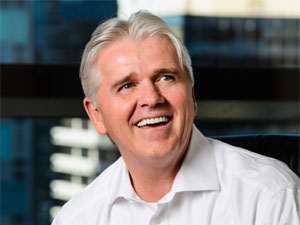Vodafone Australia resuscitation starts with insourcing

Vodafone Australia's move to hire 750 people in its Tasmanian call centre and shift away from using its Indian call centre is just the first step in rebuilding the company's damaged brand, according to CEO Bill Morrow.

On Friday morning, Vodafone announced that with AU$4 million from the federal government and AU$850,000 from the state government, the company will expand its Tasmanian call centre from 750 positions to 1,500 positions over the next few months.
Vodafone currently has another call centre based in India, but Morrow told ZDNet in an interview today that the call centre roles there would be shifted back to Australia.
"Calls have been routed to both of these, but the majority of the calls will move from India to Hobart. We'll still maintain the Indian operation, but it'll be more of a back office type activity," he said.
"The message [from customers] has been really clear: There's no doubt people just want a fast, reliable network where they need it most; they want to get to the end of the month from using that service and not have some exorbitant bill; and, finally, when they have a question they want to talk to someone live, and someone who is local," Morrow said.
"This is all designed to give our customers what they're asking for, and this step is just one in a process of many."
The decision to buck the industry trend of using offshore call centres comes as Vodafone looks to slow the rate of customers leaving the company since 2010. The company failed to anticipate the rise of smartphones, and the legacy 3G network couldn't hand the over 7 million customers that Vodafone had at the time. Vodafone invested over AU$1 billion in overhauling its 3G network, rolling out DC-HSPA+, and preparing for 4G, but customers left in droves, with Vodafone now saying that it has 6.6 million customers, including customers of its mobile virtual network operators (MVNOs).
Morrow came in as CEO as the "Mr Fix-it" for the company close to a year ago, and since then, Vodafone has embarked on a massive restructure that has seen a 35 percent cut in the company's headcount. Morrow said that now this has all been completed, Vodafone is looking ahead.
"We had to obviously match the size of our company given the customer losses we've had. Now we've made those changes, we're looking to rebuild the business," he said
The company has three main focuses to win customer trust back, Morrow said. Firstly, building a network that is not only suitable for today's needs, but is also prepared for what comes next; secondly, "taking the worry out" of using mobile phones, and simplifying the billing process; and thirdly, providing easy and simple service with local staff in its contact centres.
"It's a multi-year process. When we look back at understanding why so we can learn and fix it, the market got ahead of us. We fell behind. We're catching up now. We're going to do more than what we feel is even necessary to change that perception in our customers' eyes," he said.
"We believe we will earn that trust back."
This week, law firm Piper Alderman renewed its two-year threat to mount a class-action suit against Vodafone by calling for the 23,000 people who registered in 2011 to sign up to join the case. Morrow said he isn't concerned about the case, because Vodafone has already begun addressing customer concerns.
"I'm concerned about every customer that feels they have an issue with us, don't get me wrong, but as far as this particular allegation, or attempt to see if they can't put together a class-action suit, I'm not really bothered by [it]."
Yesterday, Vodafone Group's sister company Vodafone New Zealand beat its competitors out to launch 4G services in the country. In Australia, Vodafone is the last of the three mobile telcos to launch a 4G network, planned for later this year. Morrow said that thanks to Vodafone's 20MHz worth of 1800MHz spectrum across the country, it will be in a position to offer faster speeds than its competitors.
"With our fortunate spectrum position, we'll be the only ones to offer this contiguous 21MHz up and down channels that offers off-the-shelf equipment to deliver speeds of up to 150 megabits per second (Mbps) versus the theoretical limitations of the existing carriers' current deployments of 100Mbps," he said.
Vodafone Group CEO Vittorio Collao was quoted last month as saying that 4G is for "techno freaks" and "very early adopters". Morrow said that the need for 4G varies from market to market, but said that Australia "has already started a 4G race".
"And I think that is largely that love affair that Australians have with their smartphones and the adoption of technology here is going at a faster pace than a lot of other countries," he said.
"We're moving to a 4G world here in Australia, and Vodafone is going to be ready for it."